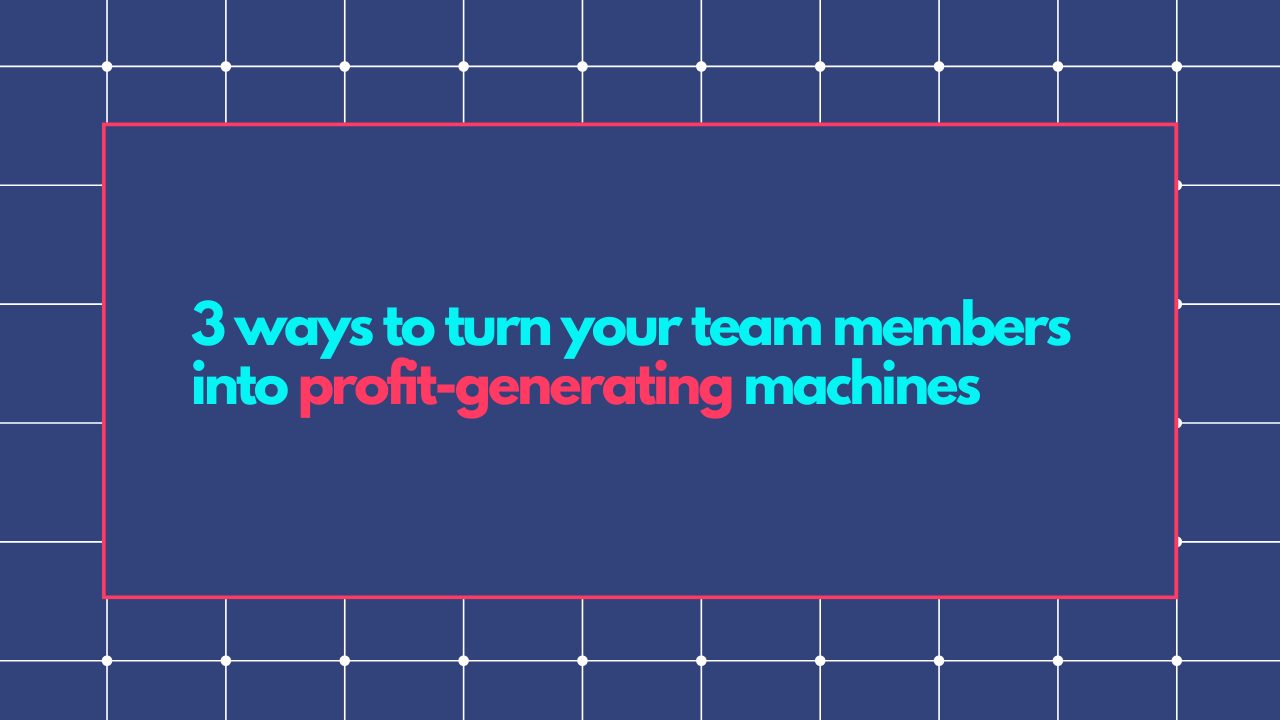There’s an age-old question floating around out there that many managers struggle to answer…
How do we get our employees to go above and beyond?
Here’s how the story usually goes:
We hire great people. We pay them well. We inspire them to do great work. And yet, more often than not, they come in and do the bare minimum.
This isn’t the same as neglecting their responsibilities—they’re accomplishing their tasks, kind of—but we often know that they have more potential than that.
Today, I want to talk about three ways to turn your employees into profit-generating machines. Because when we do these three things, we can shift things around from folks just showing up and doing the bare minimum to having employees who think proactively about growing the business.
This is especially timely as we’re looking ahead into 2024—because holy cow, you guys, it’s literally days away!
Heading into the new year, we want to have a plan. We want to make sure that everybody is on the same page and is motivated to start 2024 off with a bang.
Listen on Apple | Listen on Google | Listen on Spotify
Set Clear Priorities
In order to get our team members excited about growing the business, one of the biggest things we need to do is foster a sense of ownership in the business. We want them to feel like what they do matters, and that a win for the business is also a win for them.
The first way we can begin to create that sense of ownership is to set clear priorities with our team members.
When we do this, we want to set clear priorities that are not too vague or too numerous.
When you’re giving your team members a list of what the highest-priority tasks are, you can’t have thirty-seven things that are highest priority, especially if you have a smaller team. That’s just not realistic, and your team knows this. So if you set an unrealistic expectation in front of them, they’re going to lose trust in you very quickly, because they’ll think you’re completely out of touch with reality.
We also can’t set priorities that are too vague, because then people don’t know what they’re actually supposed to be doing.
So we want to find a sweet spot there, which usually involves setting one or two clear priorities for the year. And once we do that, we then want to connect the dots between our goals and how each individual job our team members do contributes to that goal.
That’s when our team members really begin to buy into the mission and feel that sense of ownership, because they can see how their daily tasks actually contribute to the bigger picture. Otherwise, their list of to-dos can feel meaningless and disconnected.
Here’s an example: let’s say I work at a gym, and my responsibility is putting equipment away between sessions and cleaning off machines. I might start feeling kind of demoralized, because I’m just cleaning up after people, and that’s not really a high-impact job.
But when you connect the dots for someone by saying, “Hey, we want to provide a premium experience where everybody that walks through the doors knows they’re being taken care of. It doesn’t matter how great the trainers are or how friendly the front desk worker is if the machines are dirty or if the weights are a mess. If it’s a total disaster when people walk in, they’re not going to come back. So your job of cleaning up the equipment and keeping everything pristine and having everything organized is actually one of the most important roles that we have in terms of working toward our goal to double our revenue.”
You see what I did there? When you connect the dots for people, they get excited about how they can contribute. And now that the person who cleans the equipment cares about their job, they’ll begin to innovate. They might start testing new ways to organize the weights so people can grab them faster, or they might adjust their schedule to make sure things get cleaned before peak busy times.
At that point, they’re not just doing the tasks they were given—they’re bringing proactive ideas to the table, which helps grow the business so much faster than if you were doing all the innovating yourself.
Set Clear Expectations
Next, we want to set expectations with our team members that indicate they are responsible for growing the business.
We often get disconnected from our team members in this area. We set these revenue targets, we set these goals, but we don’t really make it clear that they have a share of the responsibility for growing the business.
Part of the way we can get them connected to that responsibility is by laying out what’s in it for them; for instance, being able to get raises and bonuses, being able to get better benefits, being able to offer more trainings or conferences or travel…things like that.
We want to explain to our team members that we are all responsible for growing the business, and what we can offer them once we hit those goals. (And follow through on those promises once we hit those goals, of course!)
This way, they don’t sit around thinking that they don’t share any responsibility in that pursuit. Oftentimes I find that by telling people that this is part of how they’re evaluated, that it’s actually one of their expected responsibilities, It clicks in their minds. And that is going to be a huge accelerator for growing your business.

Set Clear Metrics and Targets
Last but not least, we want to set clear metrics and targets, and then check in on them routinely.
If you set a goal and you never check in on it, who the hell cares, right? It’s meaningless. And if you don’t set any goal at all, people don’t know what they’re marching towards, which is the fastest way to make them stop marching at all.
For example, if you have someone working on social media, you might want to set targets around impressions, shares, likes, or account growth. If you have someone who’s performing services, you could set target numbers for client rebooking rates or membership purchases.
We want to set clear goals, but just like I mentioned before, we also want to set realistic goals, because if the numbers are completely impossible, our team members won’t care anyway. They won’t try to accomplish something they already know they’ll fail at.
If you want to shoot for the moon, I suggest setting stretch goals. Start with ones you know are achievable, then work your way up!
Once we’ve set those goals, we then want to check in on them routinely. You could do this monthly or quarterly, but I honestly wouldn’t go longer than quarterly, because we won’t be able to course-correct as well.
We also want people to own their own reporting and be accountable for talking about their own reports for two reasons. First, if you are the one who’s always reporting on and asking questions about the goals you’ve set for these individual team members, accountability ends up falling entirely in your court. And if you don’t ask the right questions, the buck stops there. But the second reason is that when your team member owns whatever metrics they’re responsible for, they’re going to be proactive in trying to move the needle on that, which will result in hitting the targets much faster.
Clarify and Simplify!
These are three specific clear things that we can do at the end of this year and/or the beginning of next year to turn our team members into profit-generating machines. These things are guaranteed to make shifts, because when our teams don’t have these things, it is guaranteed to slow you down.
That’s why we do this together when you work with me on building your own Ops Playbook, because I make it as clear as possible for a team to understand exactly where you’re going and how to get there.
This removes all the obstacles in the way of that, because honestly…process should be easy. It should be simple. It should be straightforward.
So if you want support in rolling out these three things and making it easier for you to manage your team and easier for your team members to be successful, please reach out. I would love to support you with the Ops Playbook program. It’s a great way to start the beginning of the year!
WORK WITH LIA:
Want a checklist of things you can do THIS week to become a better manager (and make your job easier)? Check out my Thriving Team Checklist for a list of quick actions you can take right away with your team: https://www.liagarvin.com/checklist
Book a FREE Scale-up strategy call to for strategies to scale your team and get time back for yourself: calendly.com/liagarvin/scaleup-strategy?back=1&month=2023-08
CONNECT WITH LIA:
Website: https://www.liagarvin.com/
Instagram: https://www.instagram.com/lia.garvin/




